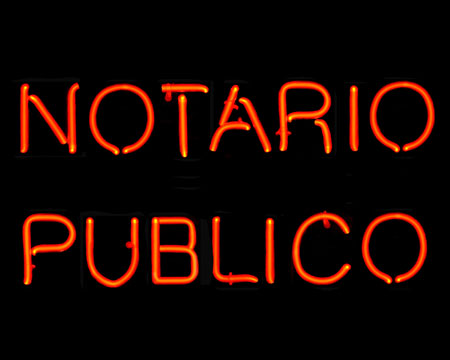 Updated 10-17-18. Any time the federal government seeks to change immigration rules, it is inevitably followed by confusion among immigrant communities and concern among those to try to help them. That is the case following the recent release of proposed new rules on immigration by the U.S. Department of Homeland Security.
Updated 10-17-18. Any time the federal government seeks to change immigration rules, it is inevitably followed by confusion among immigrant communities and concern among those to try to help them. That is the case following the recent release of proposed new rules on immigration by the U.S. Department of Homeland Security.
Legal experts are warning of the risks to immigrants of turning to so-called Notarios publico, who often can do more harm than good.
Con artists targeting immigrant victims commonly advertise fraudulent legal services using the Spanish title Notario publico or other foreign-language translations of "Notary Public." Unlike U.S. Notaries (who perform very specific and defined duties), Notaries in other countries are often asked to perform duties closer to those of attorneys.
Notarios in the United States often promise immigrant customers legal assistance with obtaining residency status, citizenship or other help with immigration-related matters in exchange for a fee. Unfortunately, they may also market themselves as low-cost alternatives to immigration attorneys.
In reality, Notarios typically collect fees from victims while providing little or no real service. Victims often discover that a Notario has either provided incorrect advice or failed to actually perform any legal work whatsoever. Many victims find themselves in legal trouble or face deportation after depending on the advice of a Notario.
To curb immigration-related fraud, many states have laws in place strictly regulating how Notaries and immigration consultants may advertise and provide their services.
Because of the confusion over the role of U.S. Notaries, many immigrants may seek help from a neighborhood Notary. Legitimate U.S. Notaries who are not attorneys or authorized specialists are prohibited from offering legal advice or assisting in the preparation of immigration-related documents.
While American Notaries are not allowed to advise or represent immigrants, you can suggest a number of resources where immigrants can find legitimate help, including qualified immigration attorneys, accredited representatives and non-legal immigration consultants (sometimes known as immigration forms specialists). Note: New York Notaries may not ask for or get legal business to send to a lawyer or lawyers with whom the Notary has any business connection or from whom the Notary receives any money or other consideration for sending the business. Also, Notaries in New York may not divide or agree to divide their fees with a lawyer, or accept any part of a lawyer’s fee on any legal business. — The Editors
David Thun is the Assistant Managing Editor with the National Notary Association.
Related Articles:
The Next Immigration Wave: What it means to Notaries
Additional Resources:
What is an Immigration Forms Specialist?